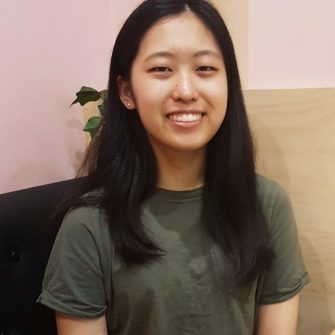
Ellen Wang
Undergraduate student
20-year-old Ellen Wang is in her final year of the Bachelor of Data Science and Decisions. She is also the 2020 President of the UNSW Data Science Society (DataSoc), one of the largest constituent Data Science societies in the country.
Ellen talks to us about DataSoc's upcoming plans, the fun ways she's been passing the time in quarantine, why working with data is rewarding and more!
You’re in your third and final year of the Bachelor of Data Science and Decisions. What attracted you to the program?
To this day, I don’t regret my impulsive decision to study data science. I really enjoyed mathematics in high school, but also wanted to get more insight into the business world. This led me to study commerce/engineering in my first term at uni.
However, after sitting in my first physics lecture of the semester, I had a pretty big 'oh no' moment and realised that I couldn’t see myself studying this for the next five and a half years. I promptly switched over to data science after one and a half weeks of university. Data science allowed me to have the best of both worlds (maths and economics) with the bonus of programming!
This year, DataSoc had planned a packed schedule of social events, educational workshops, careers events and competitions. Now that students are off campus and studying online for the coming period, what are your society’s plans to keep your members connected during the upcoming weeks/months?
While DataSoc certainly had a packed schedule planned for the year, COVID-19 took us all by surprise. However, never let it be said that the DataSoc team isn’t adaptable: we changed and challenged the way we approached student outreach, stretching the capacity for community even in physical isolation.
We hosted online workshops for Python and R over Zoom, and have been engaging with the student body using social media platforms and our fortnightly newsletter.
In terms of our future plans, we have a Virtual Scavenger Hunt being held on 16 May which we’d love for people to get involved in! See: www.facebook.com/events/524415855111846
Why did you initially get involved in DataSoc?
Initially, I joined the DataSoc subcommittee team because I was interested in event planning and execution. I found it really cool how an idea as simple as a 'Python workshop' could be turned into a reality in a series of steps: proposal/planning, room booking, marketing and execution.
Then, I realised the educational and community impact that DataSoc had on the student body and also grew to love and appreciate the amazing people I got to work with on a daily basis. These two reasons are why I chose DataSoc again and again during my short time at university.
What things are you doing to keep happy, healthy and connected to others during these uncertain times? Do you have any tips for students who might be struggling?
Don’t underestimate the importance of establishing a routine for yourself. A lot of us may not be attracted to the idea of consistent exercise or a regular sleep schedule, but these things actually work in reducing stress levels and keeping us happy and healthy.
In terms of connecting to others, social media has become more important than ever as a platform for us to communicate with each other. Whilst it is no substitute for face to face communication, it’s important not to isolate yourself and to reach out to others. Of course, I haven’t escaped the cooking craze that has taken over during COVID-19, and have been sinking hours into making edible (or not) dinners, baking macaroons, and trying the famous Dalgona coffee.
Data Scientist often features as the 'top job' in career rankings, and is frequently referred to as the 'sexiest job of the 21st Century'. Why do you believe this is?
Data, by itself, is just data. There’s nothing too fascinating about data. The fun begins when you can draw insights, extrapolate trends and make informed decisions from it.
I believe that it’s the 'sexiest job of the 21st Century' because the amount of data we are accumulating and storing is and will be growing dramatically in the coming years. A lot of it is messy and hard to understand, but that is also what makes it incredibly rewarding to analyse.
Of your experiences at uni over the past two+ years, what have you found to be the most:
- wonderful? Campus! I love finding new places to study, and so far I’ve settled on a current favourite in the Red Centre computer labs.
- challenging? Getting out of my comfort zone and meeting new people. It gets easier with practice.
- surprising? Diversity and Inclusivity. There really is something for everyone here at UNSW.
What is your dream job?
I’ve always been pretty interested in health care and I believe there is so much untapped potential when it comes to crossing over data science and health.
Do you have a favourite book?
I don’t really choose favourites when it comes to books, but my most recent read was Flowers for Algernon. This science-fiction story is about Charlie Gordon, with an IQ of 68, who goes through an experimental procedure that increases his IQ. The book is an exploration of all things human – intelligence, identity, friendship and introspection. A book that everyone should read!
Who should I interview next?
This might come as a surprise, but Dr Denis Potapov! Dr Potapov was my MATH2501 lecturer and at first seemed quite intimidating. There was a lot of tough love during the term, but many examples, questions, help sessions and lectures later, I finally understood basic concepts of linear algebra that I had struggled to grasp in first year. So I am very thankful for his teaching and would be interested to read an interview with him!
-------------------
May 2020
Interview conducted by Susannah Waters
